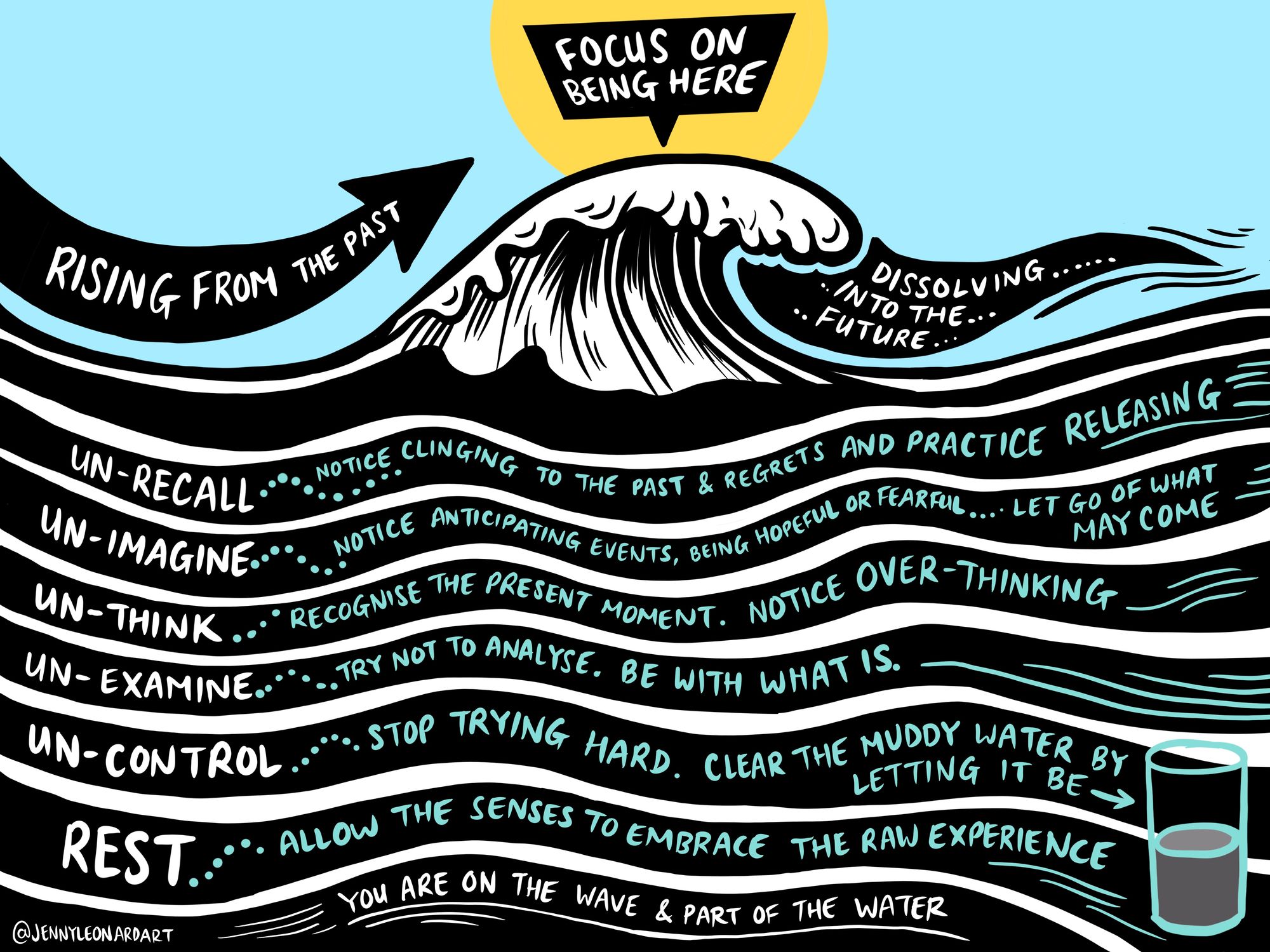
Six Words of Advice
Tilopa's 'Six Words of Advice' provide meditation guidance for people of all levels, including both beginners and experienced meditators. Despite their apparent simplicity, these six instructions hold deep meanings. One can spend a lifetime studying these simple instructions and still uncover new insights.
These teachings are central to the Mahamudra tradition, a form of meditation in Tibetan Buddhism, where Tilopa is considered a key figure and teacher of meditation. They emphasize direct experience and a non-conceptual understanding of reality.
The six instructions for meditation are:
- Don’t recall.
- Don’t imagine.
- Don’t think.
- Don’t examine.
- Don’t control.
- Rest.
Don't recall.
Let go of what has passed.
During meditation, it's common to dwell on past experiences that will often hinder your ability to be present in the here and now. It's like walking around with a cloud of fog that surrounds you, making it difficult to see what’s here in front of you right now. Childhood memories, thoughts about people from the past, or even yesterdays events can invade your mind and cause physical tension and restlessness. To be truly present, it is important to recognize the tendency to cling to the past and repeatedly practice releasing it.
Don't imagine.
Let go of what may come.
Along with rehashing old memories, the mind likes to wander into the future. You anticipate events that haven't occurred. You create hopeful and fearful scenarios about possible outcomes. You spend time worrying, daydreaming, planning, and devising ways to achieve desired results in the future.
During meditation, worrying about the future could be as simple as wondering about the time remaining in the meditation session, or it could be more complex like stressing about health, money, career choices, or anticipating other potential future events.
If you find your mind wandering towards the future and your body tensing in anticipation of events that have not yet occurred, gently release these thoughts and return to the present moment.
Don't think.
Let go of what is happening now.
In order to be fully present, we must let go of our thoughts about the past and the future. It’s common to momentarily feel present, only to be pulled away by our propensity to ruminate about the past and to worry about the future. Also, when we do focus on the present moment, we get caught in thoughts about the present. We think to ourselves, my nose is itching. Or I shouldn’t worry about my itchy nose. We often get caught in the habit of judging and thinking about the present rather than allowing ourselves to simply experience the present moment. This line of instruction is about not overthinking the experience of meditation. We can’t force ourselves to not think. The mind produces thoughts in the same way that the heart pumps blood. Thinking is simply what the mind does, but we can overthink the whole process and find ourselves thinking about thinking.
It's less about stopping thoughts and more about recognizing how the mind tries to grasp the present, to claim it. But holding onto the present is like trying to hold water in your hand: the tighter you hold, the more it slips away. The present moment is in a constant state of unfolding and change. It cannot be pinned down because it is a process, not an object. Notice whatever comes up in the present, and let it pass.
Think of the present as a surfer riding a wave. The present rises from the past and dissolves into the future, and you, the surfer, are right there, riding the wave. But you can't hold or change a wave. Enjoy it while it lasts, let it go, and then enjoy the next one.
Don't examine.
Don't try to figure anything out.
While meditating, you might hear a voice in your mind that analyzes and comments on your experience. It produces thoughts like, "Am I doing this the right way? What should I be feeling right now? Do I look silly doing this?"
This line of instruction is an invitation to notice and recognize how your mind always wants to review your present experience, questioning and doubting it. Always analyzing what is with what should be. Let go of this habit. Try to feel your experience without the need to understand anything. Try to be present and let the experience just be what it is.
Don't control.
Don't try to make anything happen.
You might start meditating with lofty goals and ideas of the peace and enlightenment you want to reach. But often, your detailed plans fall apart. You end up trying to rebuild the mental image of what you think should happen. This is similar to managing a project. But you can't treat meditation like a project. You can't force your mind into peace, quiet, or mindfulness. These aren't states you can reach by just trying really hard. You naturally enter these states when you stop trying to control everything. Imagine a glass of muddy water. The more you stir the water in an effort to make it clear, the cloudier it becomes. But if you leave it alone for a while, the dirt will sink to the bottom. Then, the water's natural clarity shows. The idea here is that you can't force the clarity to happen, but you can stop interfering with it. It's about stepping back and letting things be. In meditation, there is no need to force things to happen. Just let everything be.
Rest.
Relax, right now, and rest.
This final instruction summarizes the previous five. Each instruction requires us to let go - of the past, of future possibilities, of ongoing events, of attempts to analyze, and of desires for specific outcomes. The last instruction is simple, yet challenging: relax and rest in the present moment, allowing our senses to simply experience what is.
Despite their simplicity, these six instructions encapsulate the essence of meditation - simplicity in action and thought. They teach us to unlearn habitual thought patterns and embrace raw experiences, using focused awareness to gently and organically observe what unfolds in the present moment.

The Six Words of Advice can be recited before or reviewed during each meditation session.
Tilopa's 'Six Words of Advice' provide a simple yet profound guide for meditation practice. By letting go of past, future, and present thoughts, we can fully embrace the present moment and cultivate a focused awareness. Remember that meditation is a practice, and it takes time to see its benefits. So keep practicing and enjoy the journey!!


